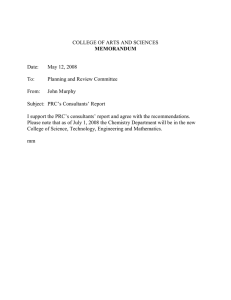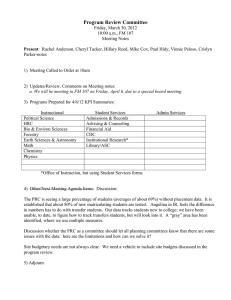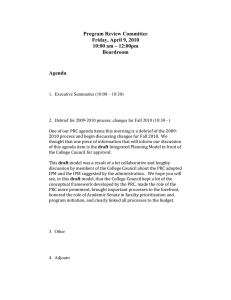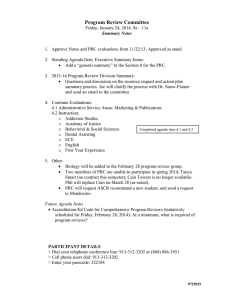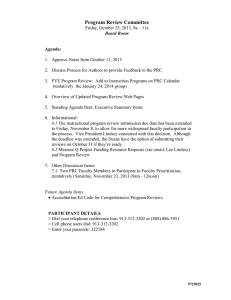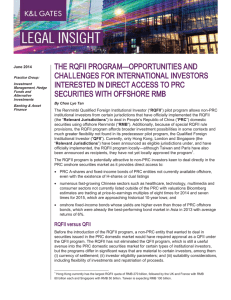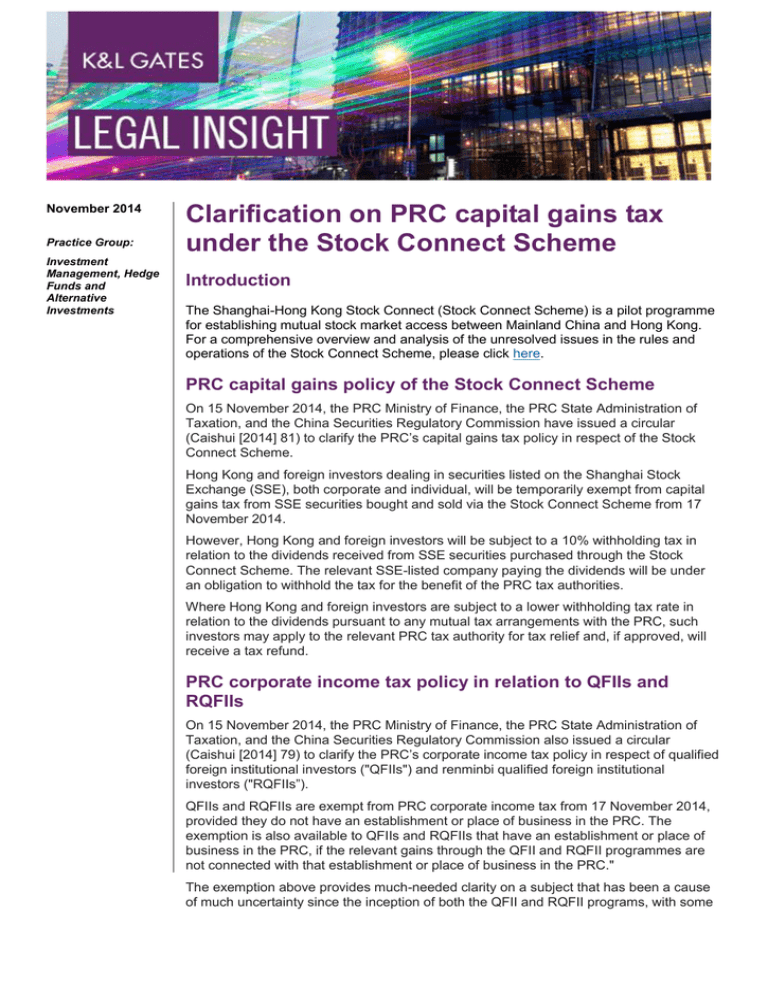
November 2014
Practice Group:
Investment
Management, Hedge
Funds and
Alternative
Investments
Clarification on PRC capital gains tax
under the Stock Connect Scheme
Introduction
The Shanghai-Hong Kong Stock Connect (Stock Connect Scheme) is a pilot programme
for establishing mutual stock market access between Mainland China and Hong Kong.
For a comprehensive overview and analysis of the unresolved issues in the rules and
operations of the Stock Connect Scheme, please click here.
PRC capital gains policy of the Stock Connect Scheme
On 15 November 2014, the PRC Ministry of Finance, the PRC State Administration of
Taxation, and the China Securities Regulatory Commission have issued a circular
(Caishui [2014] 81) to clarify the PRC’s capital gains tax policy in respect of the Stock
Connect Scheme.
Hong Kong and foreign investors dealing in securities listed on the Shanghai Stock
Exchange (SSE), both corporate and individual, will be temporarily exempt from capital
gains tax from SSE securities bought and sold via the Stock Connect Scheme from 17
November 2014.
However, Hong Kong and foreign investors will be subject to a 10% withholding tax in
relation to the dividends received from SSE securities purchased through the Stock
Connect Scheme. The relevant SSE-listed company paying the dividends will be under
an obligation to withhold the tax for the benefit of the PRC tax authorities.
Where Hong Kong and foreign investors are subject to a lower withholding tax rate in
relation to the dividends pursuant to any mutual tax arrangements with the PRC, such
investors may apply to the relevant PRC tax authority for tax relief and, if approved, will
receive a tax refund.
PRC corporate income tax policy in relation to QFIIs and
RQFIIs
On 15 November 2014, the PRC Ministry of Finance, the PRC State Administration of
Taxation, and the China Securities Regulatory Commission also issued a circular
(Caishui [2014] 79) to clarify the PRC’s corporate income tax policy in respect of qualified
foreign institutional investors ("QFIIs") and renminbi qualified foreign institutional
investors ("RQFIIs”).
QFIIs and RQFIIs are exempt from PRC corporate income tax from 17 November 2014,
provided they do not have an establishment or place of business in the PRC. The
exemption is also available to QFIIs and RQFIIs that have an establishment or place of
business in the PRC, if the relevant gains through the QFII and RQFII programmes are
not connected with that establishment or place of business in the PRC."
The exemption above provides much-needed clarity on a subject that has been a cause
of much uncertainty since the inception of both the QFII and RQFII programs, with some
more assertive RQFIIs removing provisions for related PRC withholding tax earlier this
year.
However, investment gains by QFIIs and RQFIIs before 17 November 2014 WILL be
subject to such PRC capital gains tax.
Other than as set out above, no end date has been given for these tax exemptions.
First Day Performance of the Stock
Connect Scheme
On the first day that the Stock Connect Scheme commenced operations on 17 November
2014, more than USD 1 billion in securities listed on the Shanghai Stock Exchange (SSE)
was purchased by Hong Kong and foreign investors (Northbound Trading) in the first fiveand-a-half minutes of trading, with the daily trading quota of RMB 13 billion for
Northbound Trading completely utilized at 1357 hours local time, less than five hours
after markets opened.
Comparatively, the purchase of securities listed on the Hong Kong Stock Exchange
(SEHK) by mainland investors (Southbound Trading) was considerably less active; out of
a daily quota of RMB 10.5 billion, only RMB 500 million of Southbound Trading was
conducted as at 1357 hours local time.
The majority of Northbound Trading on the first day of operations of the Stock Connect
Scheme consisted mainly of trading by retail investors, and of hedge funds and asset
managers trading for their books; trading by international institutional buyers was not as
strong by comparison, possibly due to the delayed clarification of tax issues by the
relevant Chinese authorities (which was only announced late on Friday, 14 November
2014).
Although a huge volume of trades occurred under the Stock Connect Scheme in the first
five minutes of trading, neither the SSE nor SEHK markets appeared to have been
noticeably affected, with neither market moving more than 1.5% in any direction during
the day’s heaviest trading periods.
If the first day's trading is any indication of how the Stock Connect Scheme will function in
the long-term, and provided the issue of daily limits and quotas can be effectively dealt
with in a timely and responsive manner, it will likely equal, if not overtake the QFII and
RQFII programs in its ease and flexibility of access, albeit in respect of (at least for now)
SSE listed securities only.
Author
Choo Lye Tan
choolye.tan@klgates.com
+852.2230.3528
Anchorage Austin Beijing Berlin Boston Brisbane Brussels Charleston Charlotte Chicago Dallas Doha
Dubai Fort Worth Frankfurt
Harrisburg Hong Kong Houston London Los Angeles Melbourne Miami Milan Moscow Newark New York
Orange County Palo Alto Paris Perth
Pittsburgh Portland Raleigh Research Triangle Park San Francisco São
Paulo Seattle Seoul Shanghai Singapore Spokane
Sydney Taipei Tokyo Warsaw Washington, D.C.
Wilmington
K&L Gates comprises more than 2,000 lawyers globally who practice in fully integrated
offices located on five continents. The firm represents leading multinational corporations,
growth and middle-market companies, capital markets participants and entrepreneurs in
every major industry group as well as public sector entities, educational institutions,
philanthropic organizations and individuals. For more information about K&L Gates or its
locations, practices and registrations, visit www.klgates.com.
This publication is for informational purposes and does not contain or convey legal advice. The information herein should
not be used or relied upon in regard to any particular facts or circumstances without first consulting a lawyer.
©2014 K&L Gates LLP. All Rights Reserved.

